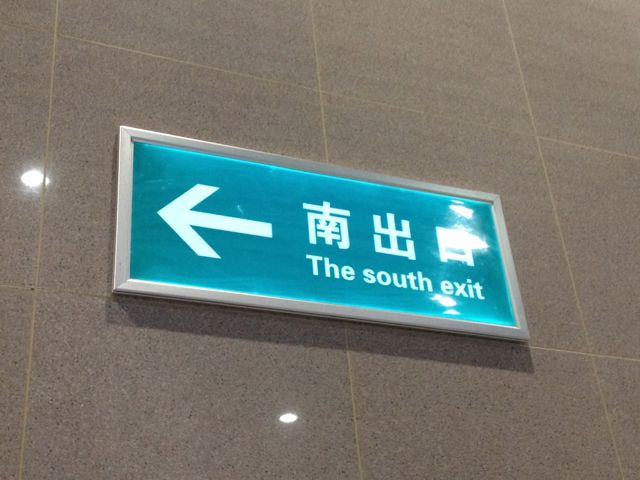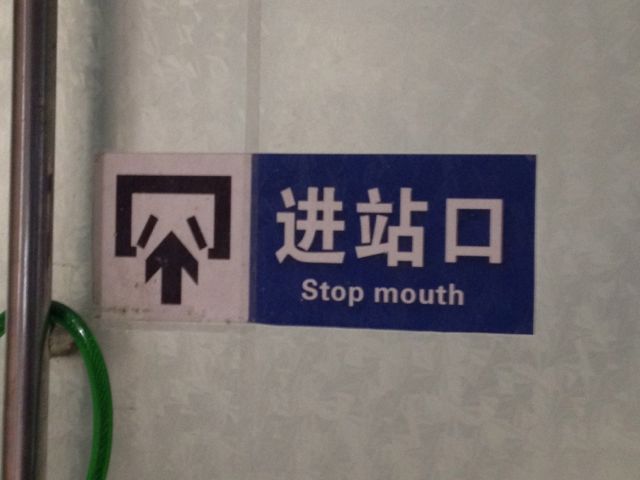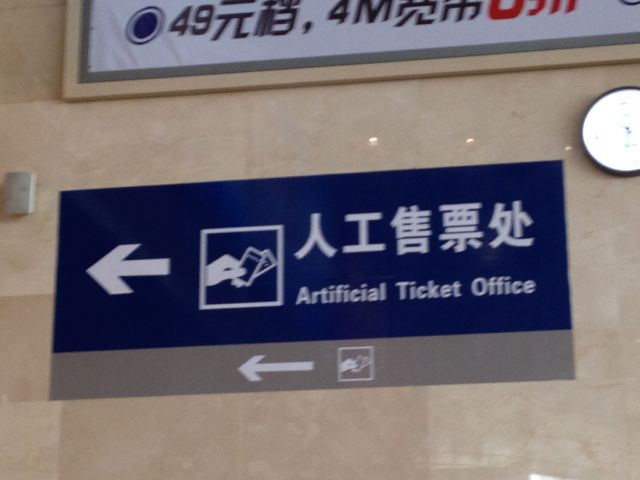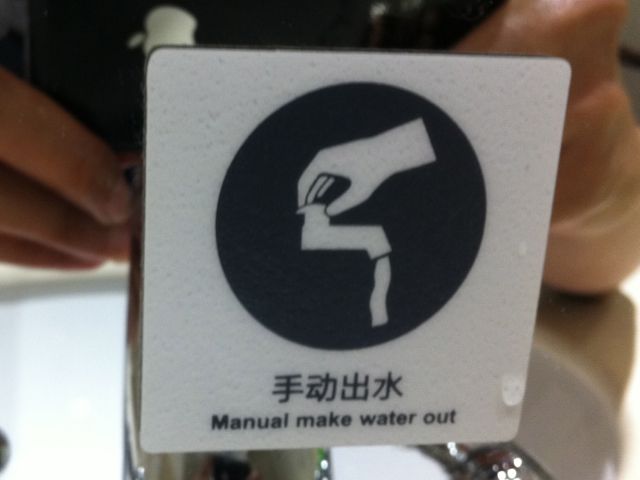All change, please!
This post has been updated and is now on a new version of this site.
This notice will remain online until 20 September 2016.
All change, please!
This post has been updated and is now on a new version of this site.
This notice will remain online until 20 September 2016.
They say that when you’re handed a Chinese fortune cookie with these words — that you’ve got — let’s just say — quite a surprise coming up!
(And probably, more often than not, it might not be what you’d want to be after.)
But yes, we do live in interesting times, and chez moi, it’s not all that bad. As of late I have been optimising China’s railway English. It’s been a funny ride — 17 of 18 China’s rail bureaus so far have adopted the new standard, and I’ve done it all through Weibo, which is Twitter with Chinese characteristics (censors obviously included, but also included are much more localised elements — such as an extra 140 characters for retweets).
The microblogs have changed the way we talk to each other. When I meet station staff in Taiyuan, that would have been the first time we caught up in the real world. And we knew each other “just” from Weibo! Around maybe just a few years back, this would have simply been impossible.
There’s a very personal reason why I got myself a PhD in communications — especially social media — because I’ve been tweeting like mad on Twitter (these years, though, I’ve been much more quiet there — probably to indoctrinate the crew on Weibo, ha ha!). It is indeed quite a ride. I’ll be posting a bit more about new media here on this blog. I’m also consolidating my Mac and tech involvements into one in the future. So whilst there might no longer be a Beijing Mac group, there’ll be something else technically related.
A tech commentary blog for sure.
The newest iPhones too. I’ve been using an iPhone 5 for a fair bit. Somehow, I can’t seem to let go of that thing…
That’s because I started helping my school clean test-tubes and beakers when I was about 15 over lunch — when I had nothing better to do after finishing my quick helping.
I’m not kidding you. It might seem a helluva strange reason: how do you mix cleaning lab gear with optimising English? But that’s the thing: it’s all about helping out and not “asking for attention”. (My friends in China tell me that this was the thing that was done half a decade ago. These days, if you help out, you’d be seen like an outdated follower of Lei Feng (“the mythical Chinese guy that helped everyone”) if you didn’t leave your name on the thing.)
Like: As of late, one of the trains that’s used my optimised English, train D365 from Beijing South to Fuzhou, got commended by the official People’s Railway Daily. But you never saw any public mentioning that “it was David Feng’s idea to equip the train with bilingual service cards, and that David had to work and retweak the cards, time and again, to get it right, and that David Feng paid from his own pocket to get the cards made ‘for real’, because he wanted the thing on the train ASAP”.
I seriously couldn’t care more. The thing is, I’m helping out because of Chinglish on the trains. Honestly, when you’re told — Please don’t throw the rubbish into the dustbin — you know that something’s gone wrong. Where else can you dump that banana you’ve just devoured? Obviously, the windows are sealed; it’d be suicide to crack these things open at 380 km/h*.
So with China concocting more Chinglish than they’re eradicating it — the rails included — it’s about high time I stepped in to stop the mess. Regard me as the lingo-savvy street cleaner, always photographing Chinglish and always correcting it. For one thing, I don’t like it when my railways scream out with Chinglish on their back. (If you bang into me you’ll see I’m Chinese, irregardless which ID I hold. And I don’t like it when Chinese Railways has to make do with sub-par Chinglish.)
Wuxi East is a cool station, and they’re probably a little cooler with standardised, optimised English all over the place. But nobody’d knew they translations were David Feng works — I deliberately left all traces of David Feng-ness off the thing. Ditto with Xi’an North — if you spot optimised English, that’ll just me doing my thing, sans credits. Oh and the same with Hanzhong and Ji’nan West.
I’m helping the rails get their English in order. (As an assistant professor of English at a key uni in China, it’s about time I did something for real — combining what I teach with what I love.) I’ve been to 22 countries and territories and I know when they’ve right-glish hanging over you in station signs. Obviously, since this is China’s railway system, I’m basing my optimised English on Chinese national norms, but I’m also making an effort to get the English up to speed by consulting with how English is used the right way in Hong Kong, Taiwan, Switzerland, and the UK. (Forget the US — they dumped the rails a long time ago…)
I don’t expect to get paid for this; I’m also not after free rides. (I paid for 34,000+ km of rail travel last year.) It’s a bit of Menschness (a la Guy Kawasaki). I’ll be happy when I slip into bed in the evenings knowing that Chinese Railways have one less sign in Chinglish, and one more sign in optimised English.
For one thing, I’m already happy now that passengers on HSR services to Shijiazhuang are no longer told: “Please don’t throw the rubbish into the dustbin”.
That for one thing sure keeps the rails cleaner!
* Soon. (I’m optimistic.)
As a decilingual, there are two things that can get you free smiles on the rails, and they all begin with “grati-”. One is, of course, a free ticket — a ticket for free and gratis. I got two of these, when Xi’an Rail took me over to climb the challenging Mt Qinling — transport to and from the mountains was included, so we didn’t fork out an extra cent. (Last year, though, I paid for over 34,000 km of rail rides!)
But the other “grati-“ is a little different: It’s called gratitude. The amazing Ürumqi Railways in northwestern China’s Xinjiang “knows” me on Weibo. They have included me twice (in the form of a @mention) on Weibo (Twitter for China, censors included — et-hmm…). And these guys aren’t people talking to the depths of the desert: over 270,000 follow these guys, and that’s about a fifth of the population of even one of the smallest provincial capitals in China.
Lately, these guys tweeted me on the Jiayang Railway in Sichuan, which still runs steam engines. (Link here in Baidupedia — Chinese text only.) They included only two people as @mentions: me, and the official China Railways account. (The official name of that account — the “Political Propaganda Department” of the Rail Ministry — scares a lot of people already, when you come to think of it. Not very approachable in name, to many an outsider.)
I decided that it was high time to keep giving back even more to the rails.
This was a true act of Weibo kindness. A veritable Weibo act of railway kindness. It got me excited about Xinjiang. Friends on Facebook knew about this. I’m now certain that I’m really looking forward to the chuanr.
I’m a weird animal in the rails: I’m a university professor (the way a lot of Americans, but probably not many a Briton or a German, might see me), and I’m not affiliated in any way with the rails. Mom, dad, and the wife have never worked for the rails either. But I’m one of the most faithful advocate of rail travel amongst “civilians” (outside the rail system), and I’m here to dump Chinglish at China’s rail stations.
Somehow this whole thing started back in April 2012, when the head of the Wuxi East Railway Station invited me to take a good look at the station. Wuxi East’s English was in good shape, but there were still a few cases of Chinglish. These went away when I optimised their English out of a move of pure kindness — they retweeted me when my wife and I was doing a live radio show, and friends like that really stand out.
What starts out well will continue well. I know that I’ll keep on helping the rails get their English up to speed. And if that merits another nice @mention from them, that’ll be neater still.
I’ve put a new “thing” on my official website as of late: my mile-o-meter, which will, for the time being, show my rail and air mileages (air mileage approximated). You can see them on the bottom of every page.
These updates come in on the 5th, 15th and 25th of every month, so everyone is up-to-date on just how much travelling I’ve done during that time.
At present I have at least 160+K kilometres by rail, so that’s obviously the big winner here. Still, my goal is to clock in more mileage — more by train in China and Europe and more by air elsewhere.
My schedule calls for visits to Harbin and Taiyuan in the not-too-distant future, and Xi’an and Zhengzhou further down the line. Those will also be my first train visits to both He’nan and Shanxi.
So, see you around!
All change, please!
This post has been updated and is now on a new version of this site.
This notice will remain online until 20 September 2016.
There. I let my emotions loose. Never mind I’ve my mixed opinions on if we should call 北京南站 either Beijing South (correct) or Beijingnan (pinyin works). But I’ve seen a few of the sickest Chinglish at China’s train stations.
China’s trains are the best on the planet. The CRH380AL, which shuttles riders all the way between Beijing and Guangdong, is the fastest train on the world when it comes to train sets in actual commercial operation this very present day. So why should a First Class HSR system make do with Second Class Chinglish?
I’ve collected a few of the crassest mistakes. I’m now on a mission to knock out all Chinglish at China’s train stations faster than the CRH380AL speed machine. Think of this as my social duty as a teacher of English and media in universities around China (Communication University, Chinese Academy of Social Sciences (Graduate School) and soon, Hebei University, if the plans work out well).
I don’t charge the rails a single half penny for this. We’ve got to give back to society once in a while. I’ve enough in the piggy bank to keep the batteries up for a fair bit of time. In the meantime, it’s time to be a lingo Mensch, as Guy Kawasaki’d say so…





Finally, on the trains, the taps themselves come with Chinglish pre-installed…
All change, please!
This post has been updated and is now on a new version of this site.
This notice will remain online until 20 September 2016.
Again, it’s time for a train journey — microphones included, please. I’ll be onboard Radio Beijing Joy FM live at 18:00 Beijing time today (Thursday, 13 September 2012) for a live programme about travel on trains, both in China and overseas. (Tune in the “traditional way” via radio: it’s FM 87.6 in and around Beijing!)
This comes at the culmination of a seven-nation train trip to Europe, where my wife Tracy and I travelled by train in Switzerland, France, Belgium, Luxembourg, the Netherlands and Liechtenstein, as well as visited the Freiburg im Breisgau Railway Station.
Present mileage here is around 23,019 km or so (not including two RER trips in Paris operated by SNCF), and I’m good to break 30,000 km within the year if all turns out fine. With 143 trips by train I am probably one of the most enthusiastic rail folks out there. I’m also a fast rider: 64.03% of these trips were at speeds of 300 km/h or faster.
This brings my global mileage from the 1990s to approximately 151,028.33 km. I have a little personal goal to reach 250,000 km by the end of 2014, in time for the second half of this still-new decade.
Sadly, I’m no longer as precisionist as I used to be: missing are specifics for train trip details as of mid-August 2012. The good thing, though, is I’m still keeping count on the timing of the trains. On one of these super-rainy Sunday afternoons when I tire of life off the rails, I’ll probably pull the rest of the figures into the database and see how things went.
Catch me live via Internet Radio (new on Sina Weibo) — click the radio icon on the official radio page on Sina Weibo, and chime in!
…looks like a very crazy combination indeed:—
But it’s the quality bit that hit me (rather, the lack of it). Whilst getting my hair done lately, I’ve been a little _____ enough to have watched Tianjin TV’s late-night news at 23:00. These guys ran something like ten ads that were the same in something like a 30-minute period. (They were ads that looked royalesque and featured supposedly an Italian (must’ve been the generic “cheap expat we can use for about a few thousand yuan for a fake ad” — I’ve heard of horror stories like that from the expat Twitterati in China) doing an ad for — out of all things — a light switch. Out of all things!) In Switzerland if you had a 30-second “main ad” by Advertiser A, followed by a 30-seconder by Advertiser B, then followed by another 10-seconder by Advertiser A, you’d feel ratty at Advertiser A already. In China, you’d wish they gave you America’s Second Amendment, as the pure repetitiveness of the ads are probably too scary. It’s a little bit extreme to, well, shoot yourself because of these ads, but you’d at least fair well feel like banging your head into the wall.
Just before the 23:00 news show, I ran into one of these “design-my-house-right” reality shows which I hated. Never mind that a bank I knew from the show was, well, “familiar to me” (although I know no real staff inside the thing). No, it was more a case that they decided to use “canned applause”, with even a little bit of the whistling effect. You can hear that they’re the same canned sound clip from around the second time they run it. I caught the “rhythm” the second time they used that canned clip. Again, a little wishful thinking of what might happen next to me if they gave us the Second Amendment. OK, I’ll let go of that. But seriously, don’t you feel like shoving your head into the fridge when all you hear on TV are like a thousand repeats of the same canned audio clip — featuring fake applause?
Whilst I’m sure I’d be banned from Tianjin for life (well, not actually) if I called it a little bit like a Shanzhai Beijing in the making, we do have to be real, folks, and face up to reality. HSR is probably one of the biggest blessings to hit the Jin — seriously. Train-wise, I’m also happy about their old Metro Line 1, but the signage on new lines look too much like Beijing. Different, though, is their accent (that spoken accent really stands out!), and their crazy road layout, and probably the road signs… and in fact I wish they’d keep that different.
Tianjin has something better to do than to mimic neighbouring Beijing — ultimately to the extent that they might want to incorporate themselves into Beijing altogether… I’d be sad when that would happen. I’d no longer have the “real life” (as in “unbureaucratic”) port city to rush to every week or so, when the Jing throws too much on me…